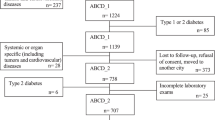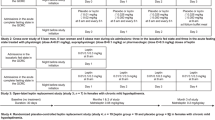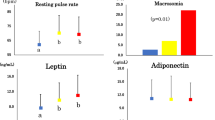Abstract
OBJECTIVE: To assess the leptin responses to a 4-day energy-restricted diet in men with different weight history; high retrospective weight gain was expected to be associated with a small decline in leptin.
DESIGN: Changes in fasting leptin and insulin were measured during a 4-day controlled intervention, in which men with high retrospective weight gain and men who had stable weight consumed 35% of their estimated energy needs.
SUBJECTS: A total of 44 healthy men (age: 31–52 y, BMI: 22.7–39.8 kg/m2) were recruited from a cohort study: 22 men who had gained weight (weight change >1 kg/y) and 22 men whose weight had remained stable (weight change ±0.3 kg/y) between the first (1987–1991) and the second measurement (1993–1997) of the cohort study. The intervention study was carried out in 2001.
RESULTS: After intervention, changes in fasting leptin levels were similar for both groups of retrospective weight gain: −2.2 μlU/ml (95% CI: −2.8; −1.7) and −2.4 μlU/ml (95% CI: −3.2; −1.7) respectively (P=0.69). Proportional changes in fasting leptin levels were different: −43.3% (95% CI: −47.8; −38.4) in the participants whose weight had remained stable (n=22) and −35.2% (95% CI: −42.4; −27.1) in those who had gained weight (n=22)(P<0.05). Analyses in a subgroup of men (n=18), in which the contrast in weight history was more pronounced than in the total group, did not show this difference. A higher proportional decrease in insulin levels was seen in men whose weight remained stable than in those who had gained weight: −35.4% (95% CI: −46.9; −21.3) and –12.8% (95% CI: −28.1; 5.7), respectively. The proportional decrease in leptin was positively associated with the proportional decrease in insulin (r=0.52; P<0.05). The decrease in leptin was positively associated with preintervention body weight (r=0.36; P<0.05), BMI (r=0.44; P<0.05), and waist-circumference (r=0.46; P<0.05).
CONCLUSION: Although we found that the 4-day energy restriction had a smaller effect on the decrease in leptin in men with retrospective weight gain, our study does not show convincing evidence that men who gained weight are less leptin responsive to changes in energy balance than those who were weight stable.
This is a preview of subscription content, access via your institution
Access options
Subscribe to this journal
Receive 12 print issues and online access
$259.00 per year
only $21.58 per issue
Buy this article
- Purchase on Springer Link
- Instant access to full article PDF
Prices may be subject to local taxes which are calculated during checkout
Similar content being viewed by others
References
Spiegelman BM, Flier JS . Obesity and the regulation of energy balance. Cell 2001; 104: 531–543.
Kolaczynski JW, Considine RV, Ohannesian J, Marco C, Opentanova I, Nyce MR, Myint M, Caro JF . Responses of leptin to short-term fasting and refeeding in humans: a link with ketogenesis but not ketones themselves. Diabetes 1996; 45: 1511–1515.
Racette SB, Kohrt WM, Landt M, Holloszy JO . Response of serum leptin concentrations to 7 days of energy restriction in centrally obese African Americans with impaired or diabetic glucose tolerance. Am J Clin Nutr 1997; 66: 33–37.
Dubuc GR, Phinney SD, Stern JS, Havel PJ . Changes of serum leptin and endocrine and metabolic parameters after 7 days of energy restriction in men and women. Metabolism 1998; 47: 429–434.
Cella F, Adami GF, Giordano G, Cordera R . Effects of dietary restriction on serum leptin concentration in obese women. Int J Obes Relat Metab Disord 1999; 23: 494–497.
Chin-Chance C, Polonsky KS, Schoeller DA . Twenty-four-hour leptin levels respond to cumulative short-term energy imbalance and predict subsequent intake. J Clin Endocrinol Metab 2000; 85: 2685–2691.
Kolaczynski JW, Ohannesian JP, Considine RV, Marco CC, Caro JF . Response of leptin to short-term and prolonged overfeeding in humans. J Clin Endocrinol Metab 1996; 81: 4162–4165.
Ahima RS, Prabakaran D, Mantzoros C, Qu D, Lowell B, Maratos-Flier E, Flier JS . Role of leptin in the neuroendocrine response to fasting. Nature 1996; 382: 250–252.
Havel PJ . Peripheral signals conveying metabolic information to the brain: short-term and long-term regulation of food intake and energy homeostasis. Exp Biol Med 2001; 226: 963–977.
Lindroos AK, Lissner L, Carlsson B, Carlsson LM, Torgerson J, Karlsson C, Stenlof K, Sjostrom L . Familial predisposition for obesity may modify the predictive value of serum leptin concentrations for long-term weight change in obese women. Am J Clin Nutr 1998; 67: 1119–1123.
Chessler SD, Fujimoto WY, Shofer JB, Boyko EJ, Weigle DS . Increased plasma leptin levels are associated with fat accumulation in Japanese Americans. Diabetes 1998; 47: 239–243.
Haffner SM, Mykkanen LA, Gonzalez CC, Stern MP . Leptin concentrations do not predict weight gain: the Mexico City Diabetes Study. Int J Obes Relat Metab Disord 1998; 22: 695–699.
Hodge AM, De Courten MP, Dowse GK, Zimmet PZ, Collier GR, Gareeboo H, Chitson P, Fareed D, Hemraj F, Alberti KG, Tuomilehto J . Do leptin levels predict weight gain?—a 5-year follow-up study in Mauritius. Mauritius Non-Communicable Disease Study Group. Obes Res 1998; 6: 319–325.
Folsom AR, Jensen MD, Jacobs DR, Hilner JE, Tsai AW, Schreiner PJ . Serum leptin and weight gain over 8 years in African American and Caucasian young adults. Obes Res 1999; 7: 1–8.
Chu NF, Spiegelman D, Yu J, Rifai N, Hotamisligil GS, Rimm EB . Plasma leptin concentrations and four-year weight gain among US men. Int J Obes Relat Metab Disord 2001; 25: 346–353.
Van Rossum CTM, Hoebee B, Van Baak MA, Mars M, Saris WHM, Seidell JC . Genetic variation in the leptin receptor gene, leptin and weight gain in young Dutch adults. Obesity Research (in press).
Verschuren WMM, Van Leer EM, Blokstra A, Seidell JC, Smit HA, Buena de Mesquita A, Obermann-de Boer GL, Kromhout D . Cardiovascular disease risk factors in The Netherlands. Neth J Cardiol 1993; 6: 205–210.
Van Rossum CTM, Hoebee B, Seidell JC, Bouchard C, Van Baak M, De Groot CPGM, Chagnon M, De Graaf C, Saris WHM . Genetic factors as predictors of weight gain in young adult Dutch men and women. Int J Obes Relat Metab Disord 2002; 26: 517–528.
WHO Study Group on Prevention of Diabetes Mellitus. Prevention of diabetes mellitus. World Health Organization: Geneva; 1994.
James WPT, Schofield EC . Different levels of analysis in estimating requirements. In: James WPT, Schofield EC (eds). Human energy requirements. Oxford Medical Publications: Oxford; 1990. pp 42–57.
World Health Organization. Principles for the estimation of energy requirements. Energy and protein requirements. Report of a Joint FAO/WHO/UNU Expert consultation, 2nd edn. World Health Organization: Geneva; 1995.
Black AE . Physical activity levels from a meta-analysis of doubly labeled water studies for validating energy intake as measured by dietary assessment. Nutr Rev 1996; 54: 170–174.
Voedingsraad. Nederlandse Voedingsnormen 1989. Voorlichtingsbureau voor de Voeding: Den Haag; 1989.
WHO Regional office for Europe. Measuring obesity—classification and description of anthropometric data. WHO Consultation on the Epidemiology of Obesity, Report No. 125. WHO: Warsaw; 1987.
Matsuda M, DeFronzo RA . Insulin sensitivity indices obtained from oral glucose tolerance testing: comparison with the euglycemic insulin clamp. Diabetes Care 1999; 22 :1462–1470.
Acknowledgements
We would like to thank the volunteers who participated in this study; the project steering committee of the Peilstation and MORGEN project for their valuable data; Caroline de Rover, Irma Thus en Ina Hengeveld of the Municipal Health Service Centre in Doetinchem for the blood collections during the intervention study; Els Siebelink for the calculation of the intervention diets, and nutritional supervision during the intervention. Maartje Jansen en Carolien Bouwman for their assistance in the preparation and implementation of the intervention study. This research was supported by the Netherlands Association for Scientific Research (ZON MW).
Author information
Authors and Affiliations
Corresponding author
Rights and permissions
About this article
Cite this article
Mars, M., de Graaf, C., van Rossum, C. et al. Leptin and insulin responses to a four-day energy-deficient diet in men with different weight history. Int J Obes 27, 574–581 (2003). https://doi.org/10.1038/sj.ijo.0802266
Received:
Revised:
Accepted:
Published:
Issue Date:
DOI: https://doi.org/10.1038/sj.ijo.0802266
Keywords
This article is cited by
-
Fasting leptin and appetite responses induced by a 4-day 65%-energy-restricted diet
International Journal of Obesity (2006)
-
Leptin Responsiveness to Energy Restriction: Genetic Variation in the Leptin Receptor Gene
Obesity Research (2004)



